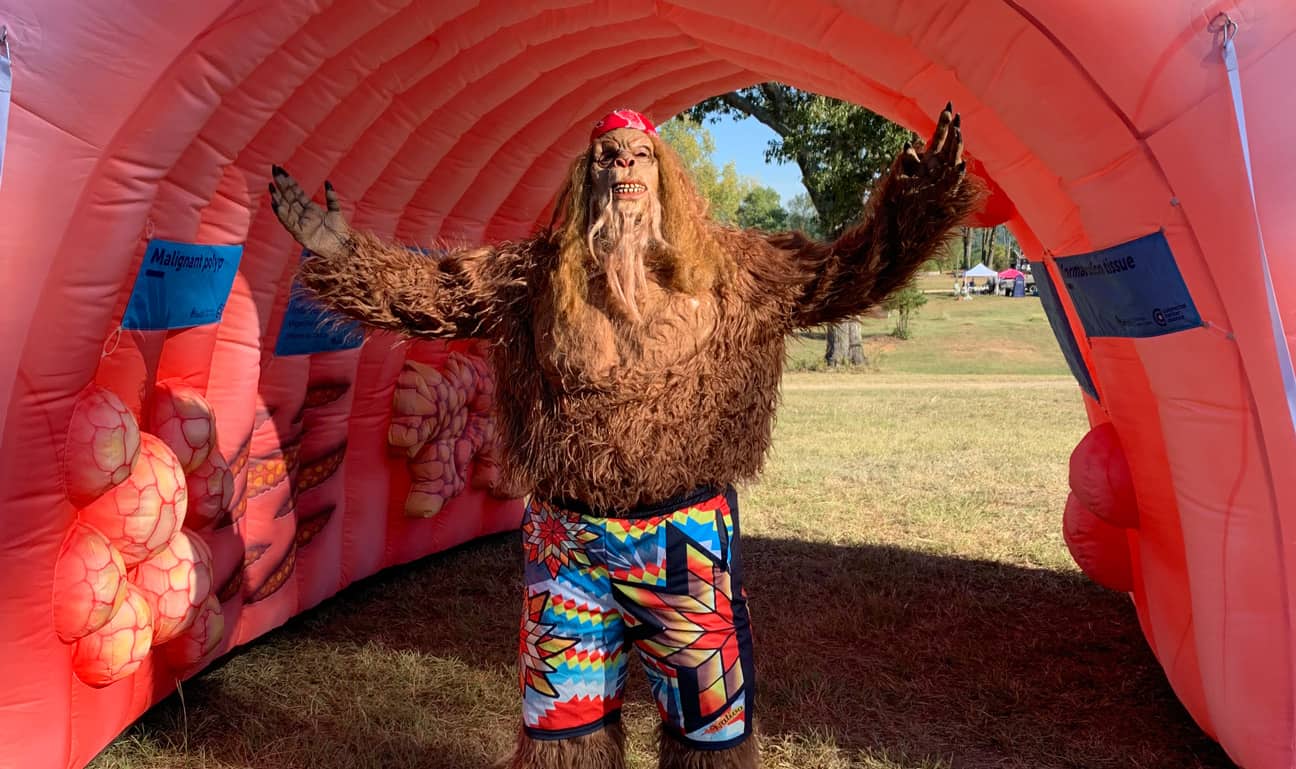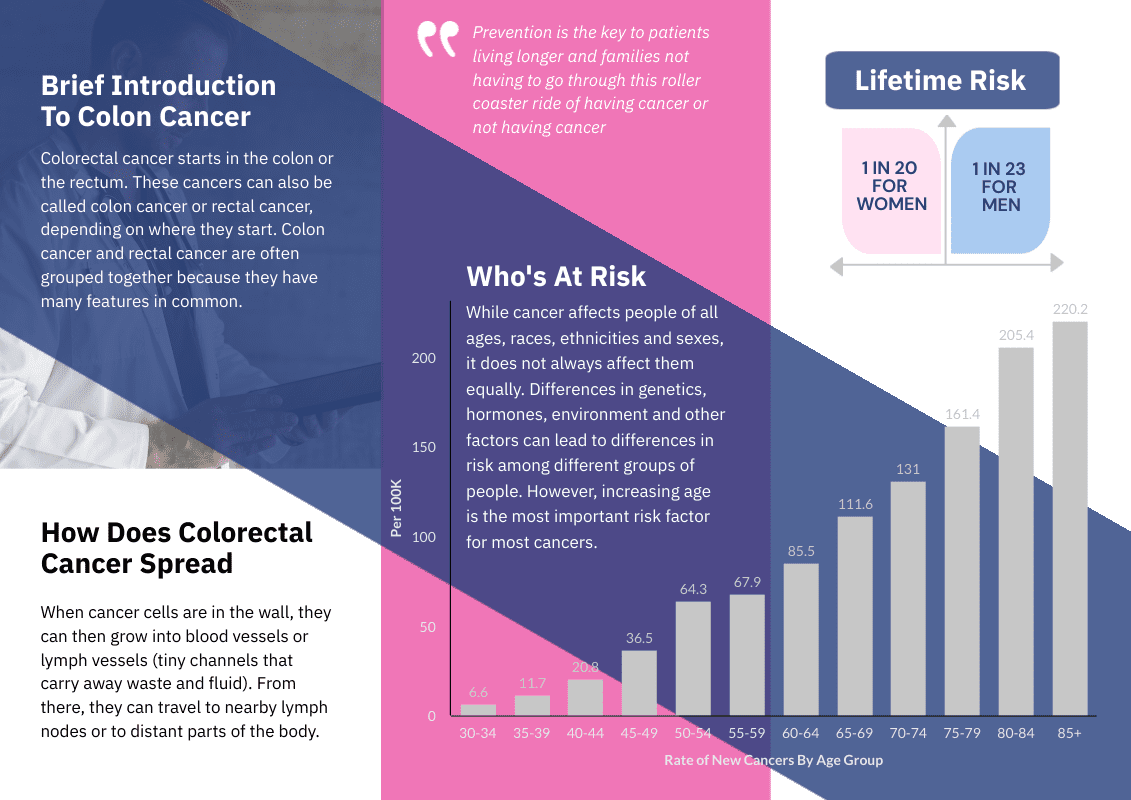
Choctaw Health Services has an inflatable, walk-through co- lon that was recently set up at the Bigfoot Festival in Honobia, Oklahoma. The colon shows examples of polyps and other common problems that can develop in the colon.
Colorectal Cancer Awareness
Published March 1, 2023By Chris Jennings
Colorectal Cancer Awareness Month is observed every year in March. Despite being a leading cause of death in Native Americans, colorectal cancer is a very treatable disease.
Native American cancer statistics vary across the United States by region. According to the American Indian Cancer Foundation (AICF), in the Southern Plains, which includes Oklahoma, Texas and Kansas, colorectal cancer is the second leading cause of cancer death for Native American men, just behind lung cancer. For Native American women, it’s the third-highest cause of death behind lung cancer at number one and breast cancer at number two.
The best method for finding colorectal cancer is regular screenings. Traditionally, this has been done with screenings where doctors look for polyps in the colon.
A polyp is a small clump of cells forming in the colon or rectum lining.
Most polyps are harmless, but some can grow into cancer. That process can take 10-15 years, so finding and removing polyps early on is the best prevention for colorectal cancer.
“A lot of times, it [colon cancer] just starts as a polyp in your colon that’s never detected. People don’t do their screenings, don’t do their colonoscopies. Then it can just grow unchecked, eventually spreading into other organs, other body systems and causing bigger issues,” said Natassia Zink, an RN with Choctaw Nation Health Services.
There are several risk factors for colorectal cancer that you can change.
According to the American Cancer Society, many lifestyle-related things have been linked to colorectal cancer.
The links between diet, weight and exercise and colorectal cancer risk are some of the strongest for any cancer. However, factors like age and family history can unfortunately not be changed.
“Age is a big one, and family history is the next largest. If you have a family history of colorectal cancer, you’re much more likely to have something yourself,” Michelle Gibson, Director of Preventative Health for the Choctaw Nation.
Gibson lost her father to colon cancer in 2004. Gibson said if he had gotten a colonoscopy as part of a regular health screening, he might not have died so early.
More often than not, there are no symptoms of colorectal cancer, so screening is the best prevention.
The CDC recommends screening for men and women over the age of 45. Although, if you have a family history of cancer, your doctor may want to start screening earlier.
Gibson said they go by age, “Whatever age they [the family members] were when they found out they had the cancer, then they would screen sooner,” she said.
If they catch colorectal cancer early, it’s often treatable.
“If it’s found early, they can do a colonoscopy. If it’s super early, especially at the polyp stage, they can go ahead and take them out right then and there,” said Zink.
There have been major advancements in colon screenings in recent years. However, the stigma surrounding colonoscopies keeps people from getting screened.
Zink, who spends a lot of her time calling people about getting screened, says they’re apprehensive as soon as they find out who she is and what she’s calling about.
“Everybody knows what a colonoscopy is. Most people know that they don’t want one, they’re never going to have one, and that’s where they draw the line,” said Zink.
The Choctaw Nation is taking steps to counteract these apprehensions by embracing new screening advancements.
Zink can send a fecal occult blood test (FOBT) to patients before regular doctor visits.
The FOBT tests don’t test for cancer but for blood in the stool, which can be a sign of something wrong in the colon.
The program is part of the Moonshot Grant in partnership with the Oklahoma University Stephenson Cancer Center. Gibson originally started working on the grant, and Zink took over two years ago.
The FOBT tests are done annually as a first step in preventing colorectal cancer.
“The FOBT kit is the first step, so it doesn’t stand alone. If it comes back negative, you do another one the next year, if it’s positive, then you’re still going to need a colonoscopy,” Zink said.
Currently, the tests are only being sent to patients before their appointments at the Stigler and Poteau health clinics, but all the Choctaw Nation clinics have them available.
The return rate of the tests sent out ahead of time shows how successful the program is.
“In 2022, I sent out 565 kits, and 425 of those came back,” Zink said. Of those 425, 42 had a positive screening for blood in the stool. What that data, that’s 42 people who otherwise may not have known there was a problem and needed a more thorough screening.
Before the FOBT kits were sent to patients before their appointments, Zink said the return rate could have been better.
“People weren’t coming for their appointments. Or they would be given this kit at the doctor’s office, throw it down in the seat of their car, and that’s where it would stay until it got thrown away,” she said. “When you’re going to the doctor, you do everything you’re supposed to do before your appointment. You eat right. You try to lose a little bit of weight, especially our diabetics. You want to please that provider when you walk through the door. So that was our big initiative to get these to the patients before their appointment.”
The importance of screening for colorectal cancer can’t be overstated.
“This is what we need to focus on. Prevention is the key to patients living longer and families not having to go through this roller coaster ride of having cancer or not having cancer,” Gibson said.
Talk to your primary care physician about getting screened for cancer with a colonoscopy or the FOBT kit.


